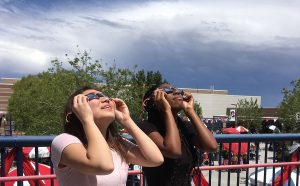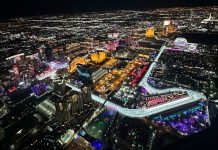By Saveria Farino

Despite being slightly overcast, science classes headed out to the quad to view the partial solar eclipse on Monday, Aug. 21 during second through fifth periods. Students learned all about this unique event, as they viewed the sky using special eclipse sunglasses. Afterward, the classes discussed the different types of eclipses, when they appear, and how the moon covers the sun.
“I’m glad Mrs. Bolken taught us about the solar eclipse. It would’ve been really cool to have been in a totality zone and be in complete darkness during the middle of the day, but seeing only a part of it was still interesting,” Gianna Irungaray, freshman, said.
A total solar eclipse, visible from coast to coast, has not happened in the United States since 1918. This type of eclipse only occurs when the moon appears to completely cover the sun in the sky. During this time, the sun’s outer atmosphere, the corona, becomes visible. This allows observers to experience almost complete darkness during the middle of the day. In the Henderson and Las Vegas area, from 9:09 a.m. until 11:52 a.m., spectators viewed a partial eclipse.
“This has not happened in hundreds of years, and they [the students] should be apart of it. The more we experience our world, we might appreciate it a little bit more. We just move around and do our thing but we should take time and appreciate the earth,” Mrs. Jackson, AP environmental science teacher, said.
The next visible eclipse will be the total lunar eclipse, where the sun, earth, and moon form a straight line on January 31, 2018. During this phenomenon, the moon passes through the earth’s shadow appearing red in the sky.
“I think it is important for students to learn about it [the solar eclipse] in school because it’s fascinating. It affects our entire world and occurs very rarely. I do plan on watching the lunar eclipse because it is such a beautiful sight to see,” Nick Rivela, senior, said.











